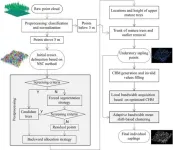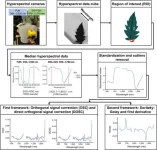Under embargo until Wednesday 13 March 2024, 16:00 UK time / 12:00 US Eastern time
Global GDP loss from climate change will increase exponentially the warmer the planet gets when its cascading impact on global supply chains is factored in, finds a new study led by UCL researchers.
The study, published in Nature, is the first to chart “indirect economic losses” from climate change on global supply chains that will affect regions that would have been less affected by projected warming temperatures.
These previously unquantified disruptions in supply chains will further exacerbate projected economic losses due to climate change, bringing a projected net economic loss of between $3.75 trillion and $24.7 trillion in adjusted 2020 dollars by 2060, depending on how much carbon dioxide gets emitted.
Senior author Professor Dabo Guan (UCL Bartlett School of Sustainable Construction) said: “These projected economic impacts are staggering. These losses get worse the more the planet warms, and when you factor in the effects on global supply chains it shows how everywhere is at economic risk.”
As the global economy has grown more interconnected, disruptions in one part of the world have knock-on effects elsewhere in the world, sometimes in unexpected ways. Crop failures, labour slowdowns and other economic disruptions in one region can affect the supplies of raw materials flowing to other parts of the world that depend on them, disrupting manufacturing and trade in faraway regions. This is the first study to analyse and quantify the propagation of these disruptions from climate change, as well as their economic impacts.
As the Earth warms, the worse off economically it becomes, with compounding damage and economic losses climbing exponentially as time goes on and the hotter it gets. Climate change disrupts the global economy primarily by health costs from people suffering from heat exposure, work stoppages when it’s too hot to work, and economic disruptions cascading through supply chains.
The researchers compared expected economic losses across three projected global warming scenarios, called “Shared Socioeconomic Pathways”, based on low, medium and high projected global emissions levels. The best-case scenario would see global temperatures rise by only 1.5 degrees C over preindustrial levels by 2060, the middle track, which most experts believe Earth is on now, would see global temperatures rise by around 3 degrees C, and the worst-case scenario would see global temperatures rise by 7 degrees C.
By 2060, projected economic losses will be nearly five times as much under the highest emissions path than the lowest, with economic losses getting progressively worse the warmer it gets. By 2060, total GDP losses will amount to 0.8% under 1.5 degrees of warming, 2.0% under 3 degrees of warming and 3.9% under 7 degrees of warming.
The team calculated that supply chain disruptions also get progressively worse the warmer the climate gets, accounting for a greater and greater proportion of economic losses. By 2060, supply chain losses will amount to 0.1% of total global GDP (13% of the total GDP lost) under 1.5 degrees of warming, 0.5% of total GDP (25% of the total GDP lost) under 3 degrees, and 1.5% of total GDP (38% of the total GDP lost) under 7 degrees.
Co-lead author, Dr Daoping Wang of King's College London, said: “The negative impacts of extreme heat sometimes occur quietly on global supply chains, even escaping our notice altogether. Our developed Disaster Footprint model tracks and visually represents these impacts, underlining the imperative for global collaborative efforts in adapting to extreme heat.”
For example, although extreme heat events occur more often in low-latitude countries, high-latitude regions, such as Europe or the United States, are also at significant risk. Future extreme heat is likely to cost Europe and the US about 2.2% and about 3.5% of their GDP respectively under the high emission scenario. The UK would lose about 1.5% of its GDP, with chemical products, tourism and electrical equipment industries suffering the greatest losses. Some of these losses originate from supply chain fluctuations caused by extreme heat in countries close to the equator.
The direct human cost is likewise significant. Even under the lowest path, 2060 will see 24% more days of extreme heatwaves and an additional 590,000 heatwave deaths annually, while under the highest path there would be more than twice as many heatwaves and an expected 1.12 million additional annual heatwave deaths. These impacts will not be evenly distributed around the world, but countries situated near to the equator will bear the brunt of climate change, particularly developing countries.
Co-lead author, Yida Sun from Tsinghua University said: “Developing countries suffer disproportionate economic losses compared to their carbon emissions. As multiple nodes in developing countries are hit simultaneously, economic damage can spread rapidly through the global value chain.”
The researchers highlighted two illustrative examples of industries that are part of supply chains at risk from climate change: Indian food production and tourism in the Dominican Republic.
The Indian food industry is heavily reliant on imports of fats and oils from Indonesia and Malaysia, Brazilian sugar, as well as vegetables, fruits and nuts from Southeast Asia and Africa. These supplier countries are among those most affected by climate change, diminishing India’s access to raw materials, which will diminish its food exports. As a result, the economies of countries reliant on these foods will feel the pinch of diminished supply and higher prices.
The Dominican Republic is expected to see a decline in its tourism as its climate grows too warm to attract vacationers. A nation whose economy is heavily reliant on tourism, this slowdown will hurt tourism-reliant industries including manufacturing, construction, insurance, financial services, and electronic equipment.
Professor Guan said: “This research is an important reminder that preventing every additional degree of climate change is critical. Understanding what nations and industries are most vulnerable is crucial for devising effective and targeted adaption strategies.”
Notes to Editors
For more information or to speak to the researchers involved, please contact Michael Lucibella, UCL Media Relations. T: +44 (0)75 3941 0389, E: m.lucibella@ucl.ac.uk
Yida Sun, Shupeng Zhu, Daoping Wang, Jianping Duan, Hui Lu, Hao Yin, Chang Tan, Lingrui Zhang, Mengzhen Zhao, Wenjia Cai, Yong Wang, Yixin Hu, Shu Tao, Dabo Guan1, ‘Global supply chains amplify economic costs of future extreme heat risk’ will be published in Nature on Wednesday 13 March 2024, 16:00 UK time, 12:00 EST and is under a strict embargo until this time.
The DOI for this paper will be https://doi.org/10.1038/s41586-024-07147-z.
Additional material
Professor Dabo Guan's academic profile
UCL Bartlett School of Sustainable Construction
UCL The Bartlett Faculty of the Built Environment
About UCL – London’s Global University
UCL is a diverse global community of world-class academics, students, industry links, external partners, and alumni. Our powerful collective of individuals and institutions work together to explore new possibilities.
Since 1826, we have championed independent thought by attracting and nurturing the world's best minds. Our community of more than 50,000 students from 150 countries and over 16,000 staff pursues academic excellence, breaks boundaries and makes a positive impact on real world problems.
The Times and Sunday Times University of the Year 2024, we are consistently ranked among the top 10 universities in the world and are one of only a handful of institutions rated as having the strongest academic reputation and the broadest research impact.
We have a progressive and integrated approach to our teaching and research – championing innovation, creativity and cross-disciplinary working. We teach our students how to think, not what to think, and see them as partners, collaborators and contributors.
For almost 200 years, we are proud to have opened higher education to students from a wide range of backgrounds and to change the way we create and share knowledge.
We were the first in England to welcome women to university education and that courageous attitude and disruptive spirit is still alive today. We are UCL.
www.ucl.ac.uk | Follow @uclnews on X (formerly Twitter) | Read news at www.ucl.ac.uk/news/ | Listen to UCL podcasts on SoundCloud | View images on Flickr | Find out what’s on at UCL Minds
END






